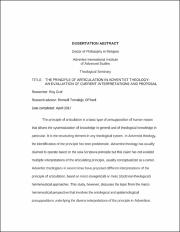| dc.contributor.author | Graf, Roy | |
| dc.date.accessioned | 2021-07-06T01:44:00Z | |
| dc.date.available | 2021-07-06T01:44:00Z | |
| dc.date.issued | 2017-04 | |
| dc.identifier.uri | https://dspace.aiias.edu/xmlui/handle/20.500.12977/423 | |
| dc.description | Published Dissertation (PhD Religion)
Shelf Location : BX6121 .G73 2019 | en_US |
| dc.description.abstract | The principle of articulation is a basic type of presupposition of human reason that allows the systematization of knowledge in general and of theological knowledge in particular. It is the structuring element in any theological system. In Adventist theology, the identification of the principle has been problematic. Adventist theology has usually claimed to operate based on the sola Scriptura principle but this claim has not avoided multiple interpretations of the articulating principle, usually conceptualized as a center. Adventist theologians in recent times have proposed different interpretations of the principle of articulation, based on micro (exegetical) or meso (doctrinal-theological) hermeneutical approaches. This study, however, discusses the topic from the macro hermeneutical perspective that involves the ontological and epistemological presuppositions underlying the diverse interpretations of the principle in Adventism.
This study purposes to (1) explain phenomenologically the principle of articulation and its basic components in theology; (2) analyze and evaluate in the light of the sola Scriptura principle the various interpretations of the principle of articulation in current Adventist theology, considering their possible connections with Christian tradition; and (3) propose an interpretation of the principle of articulation for Adventist theology that aims to be more consistent with sola Scriptura.
Chapters 1 points out to the multiple proposed centers in Adventist theology and suggests facing the issue from the epistemological perspective of the concept of principle of articulation. Chapter 2 works as a methodological chapter that offers a phenomenological description of the principle of articulation in theological systems and expands the methodological considerations of Chapter 1. Chapter 3 reviews the main models of interpretation of the principle of articulation in Christian tradition, and the interpretation of the principle among Adventist pioneers, providing a useful background to understand the plurality of interpretations in Adventist theology. Chapter 4 discusses the three main models of interpretation of the principle of articulation in Adventist theology: evangelical Adventist model, modern Adventist model, and Adventist theodicy model. The chapter offers a critical evaluation of each model at the level of the macro hermeneutical presuppositions, in light of the sola Scriptura principle. Chapter 5 proposes a biblical systematic interpretation of the principle of articulation where Christ performs the articulating role between God and the world-humanity—the entire reality—through the sanctuary structural pattern of relationship. Chapter 6 summarizes the findings and offers general conclusions and recommendations. | en_US |
| dc.language.iso | en_US | en_US |
| dc.publisher | Adventist International Institute of Advanced Studies | en_US |
| dc.subject | Theology, Doctrinal -- Seventh-day Adventists. | en_US |
| dc.subject | Seventh-day Adventists -- Theology. | en_US |
| dc.subject | Hermeneutics. | en_US |
| dc.subject | Seventh-day Adventists -- Doctrines. | en_US |
| dc.title | The Principle of articulation in Adventist theology : an evaluation of current interpretations and proposal | en_US |
| dc.type | Dissertation | en_US |

